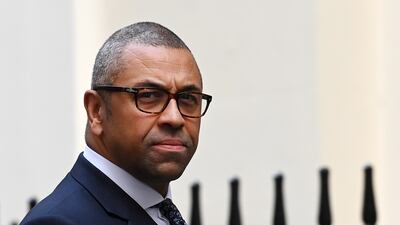The UK is spending millions of pounds in strengthening Ukraine’s cyber defences, protecting the country’s critical infrastructure and public services against malicious attacks, the government has revealed.
In response to a rising “tempo” of Russian cyber activity after President Vladimir Putin’s invasion in February, an initial £6.35 million ($7.2m) package was introduced..
But it has been kept quiet until now for security reasons, the government said.
It came after the National Cyber Security Centre, part of the intelligence organisation GCHQ, published its annual review, finding that the cyber security threat to the UK has “evolved significantly” over the past year, with 18 ransomware incidents requiring a nationally co-ordinated response.
These included attacks on a National Health Service supplier and a water utility company, it said.
So far, the Ukraine scheme has provided incident response support, helped to harden critical infrastructure against future attacks, and delivered frontline cyber-security systems including firewalls and forensic capabilities, to offer an extra layer of protection and understanding.
Foreign Secretary James Cleverly warned that Russia’s assault on Ukraine is “not limited to its horrific land invasion”, as Moscow has “persistently attempted to invade Ukraine’s cyber space, threatening critical information, services and infrastructure”.
The government said Russian actors had a “long history of hostile and destabilising activity” against Ukraine, with past targets claimed to include the country’s electricity grid, finance and energy sectors, and Kyiv’s metro and Odesa’s airport.
Ukraine war latest - in pictures
The NCSC has previously said it has “high confidence” that Russia’s GRU military intelligence agency was “almost certainly” behind some of these attacks, including the disruption to the transport system.
Moscow has denied involvement in cyber strikes on Ukraine in the past.
“The UK’s support to Ukraine is not limited to military aid," Mr Cleverly said. "We are drawing on Britain’s world-leading expertise to support Ukraine’s cyber defences.
“Together, we will ensure that the Kremlin is defeated in every sphere: on land, in the air and in cyber space.”
NCSC chief executive Lindy Cameron said: “The NCSC is proud to have played a part in supporting Ukraine’s cyber defenders.
“They have mounted an impressive defence against Russian aggression in cyber space, just as they have done on the physical battlefield.
“The threat remains real and the UK’s support package is undoubtedly bolstering Ukraine’s defences further.”
Ukraine capital Kyiv hit by kamikaze drones - in pictures
On Tuesday, British Defence Secretary Ben Wallace said battlefield momentum remained with Ukraine, with Crimea expected to come within range of Ukrainian artillery by the end of November.
“The direction of travel is that I think it is likely that by the end of this month, the northern part of Kherson will be depleted of Russians or the Russians will have left that part, which brings into range parts of Crimea from long-range artillery that the Ukraine held or the Himars-type [multiple rocket launcher] systems,” Mr Wallace told a House of Lords committee.
Kherson, in southern Ukraine, is under Russian occupation and Russian-installed local authorities have sought to move civilians from the area in anticipation of a Ukrainian offensive.
Mr Wallace said Russian forces continued to suffer from a lack of equipment and poor morale, and said he expected fighting to continue through the winter.
Boris Johnson suspects Putin will not resort to nuclear strike in war with Ukraine
Former UK prime minister Boris Johnson has said he does not believe Mr Putin will use a tactical nuclear weapon in the conflict with Ukraine, as it would be “crazy” to wreak “total disaster” on his own country.
He said he suspected it would start an “absolutely hysterical reaction” in Russia.
“I don’t think he will. I think he’d be crazy to do so," Mr Johnson told Sky News.
“I think what would happen is that he would immediately tender Russia’s resignation from the club of civilised nations. It would be a total disaster for his country.
“So the current economic punishment that the West has been able to dish out would be massively intensified. Russia would be put into a kind of cryogenic economic freeze.”
Boris Johnson delivers farewell speech at 10 Downing Street - in pictures
Mr Johnson said Mr Putin would also lose a lot of the “kind of middle ground of global tacit acquiescence that he’s had”.
“There’s a lot of willingness to give Putin the benefit of the doubt. That will go the minute he does anything like that,” he said.
“He would also, crucially, I think, lose the patronage of the Chinese. And above all in his own country, I think he would trigger an absolutely hysterical reaction.”
Meanwhile, Mr Johnson said he did not think it was “credible” for Mr Putin to retain the territory his troops still hold in regions such as Kherson, in southern Ukraine.
“I don’t think that’s credible for him any more,” he said.






















































